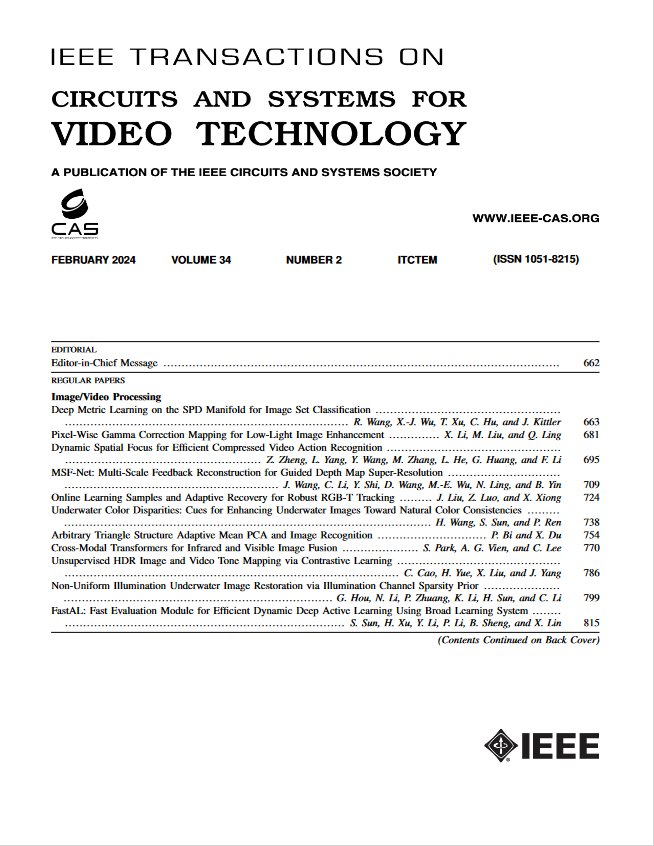A Theoretical and Experimental Study for Dependent Learned Rate-Distortion Optimization
IF 11.1
1区 工程技术
Q1 ENGINEERING, ELECTRICAL & ELECTRONIC
IEEE Transactions on Circuits and Systems for Video Technology
Pub Date : 2025-03-26
DOI:10.1109/TCSVT.2025.3555152
引用次数: 0
Abstract
Recent advancements in learned rate-distortion optimization (RDO) showcase that by making the intra coding decisions based on a learned measure, the encoding can be significantly accelerated without incurring much coding loss. Despite great progress in complexity reduction, the dependency issue has been largely neglected in the current learned RDO research. In this study, aiming to tap the full potential of dependent learned RDO, we first derive a probabilistic RDO framework for theoretical analysis, under which the classic and the learned RDO problems are equivalent to the maximum a posteriori (MAP) inference and the distribution imitation, respectively. Subsequently, we probabilistically revisit dependency considerations in the intra RDO research. Our key finding is that the existing learned RDO scheme can only produce a measure that indicates the local “goodness” of coding decisions. We therefore further discuss the opportunities for learning a dependent measure that is more optimal in the long run. Finally, as learning an accurate measure for the full decision space could be extremely challenging, taking the High Efficiency Video Coding (HEVC) intra coding as a case study, we experimentally identify that the prediction decision accounts for the majority of the dependent optimization gain and is of the utmost value to be learned, paving the way for future research on dependent learned RDO.依赖学习率失真优化的理论与实验研究
学习率失真优化(RDO)的最新进展表明,通过基于学习测度的编码决策,可以在不产生太多编码损失的情况下显著加快编码速度。尽管在复杂性降低方面取得了很大的进展,但依赖问题在当前的RDO研究中却被很大程度上忽视了。在本研究中,为了充分挖掘依赖学习RDO的潜力,我们首先推导了一个概率RDO框架进行理论分析,在该框架下,经典RDO问题和学习RDO问题分别等效于最大后验推理和分布模仿。随后,我们可能会重新审视RDO内部研究中的依赖因素。我们的主要发现是,现有的学习RDO方案只能产生一种度量,表明编码决策的局部“好”。因此,我们进一步讨论学习从长远来看更优的依赖度量的机会。最后,由于学习完整决策空间的准确度量可能是极具挑战性的,我们以高效视频编码(HEVC)内部编码为例进行了实验研究,我们通过实验确定了预测决策占依赖优化增益的大部分,并且具有最大的学习价值,为未来依赖学习RDO的研究铺平了道路。
本文章由计算机程序翻译,如有差异,请以英文原文为准。
求助全文
约1分钟内获得全文
求助全文
来源期刊
CiteScore
13.80
自引率
27.40%
发文量
660
审稿时长
5 months
期刊介绍:
The IEEE Transactions on Circuits and Systems for Video Technology (TCSVT) is dedicated to covering all aspects of video technologies from a circuits and systems perspective. We encourage submissions of general, theoretical, and application-oriented papers related to image and video acquisition, representation, presentation, and display. Additionally, we welcome contributions in areas such as processing, filtering, and transforms; analysis and synthesis; learning and understanding; compression, transmission, communication, and networking; as well as storage, retrieval, indexing, and search. Furthermore, papers focusing on hardware and software design and implementation are highly valued. Join us in advancing the field of video technology through innovative research and insights.

 求助内容:
求助内容: 应助结果提醒方式:
应助结果提醒方式:


